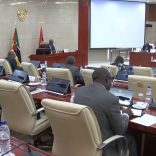Mozambique: New institute to manage public works
Mozambique: CIP considers security agreement with Total discriminatory

The Centre for Public Integrity (CIP), a Mozambican non-governmental organization (NGO), says today that the security agreement between the government and the French multinational Total is discriminatory, calling for a “comprehensive” understanding.
On August 24, Total announced a review of its memorandum of understanding with the Mozambican government concerning a joint security force for the Area 1 natural gas project in the Rovuma basin, northern Mozambique.
In an analysis of the agreement, CIP understands that the Mozambican executive and Total ignored the impact of the armed conflict elsewhere in the province of Cabo Delgado by focusing geographically on the understanding in Area 1 – Afungi, in the district of Palma.
“As this is an important document that provides for measures in the face of the conflict in Cabo Delgado with a view to protecting the investments made in that province and guaranteeing the benefits of the exploitation of resources in general, it would be expected that it would involve other companies that also operate in that part of the country,” the CIP report reads.
On the other hand, the text continues, the districts and localities plagued by the action of armed groups are interconnected, a situation that requires more comprehensive security strategies.
“It is also important to emphasize that the memorandum of understanding [between the government and Total] will have a direct impact on the life of local communities, the business community in the province, on the inspection capacity of the National Petroleum Institute [INP] and the National Institute of Mines [INAMI], and in the lives of Mozambicans in general,” the CIP says.
The CIP also points out that the agreement impinges upon Mozambique’s national sovereignty, because it delegates national security matters to a company pursuing strictly private interests.
CIP emphasises that the expenses resulting from the agreement must be regulated, taking into account that the costs will fall upon the investments of the consortium project and therefore lower the tax revenues of the Mozambican state.
“The fact that the memorandum of understanding is kept as a confidential document makes it even more difficult for the regulator to monitor recoverable costs,” the CIP analysis advances.
The NGO considers Total’s concerns about the security of its enterprise in the Rovuma basin understandable in the face of the armed attacks in the region, but stresses that any initiative in this area must be “comprehensive”.
In this sense, it continues, any approach to security must involve greater coordination between state institutions and companies in the extractive sector, namely through “joint force” responses.
Reaad more: Total CEO meets Mozambican leader over escalating insurgency – Bloomberg
Following the agreement in August, the French oil company told Lusa by way of clarification that “the revision of the safety memorandum reflects the increase in activities during the construction phase and the mobilisation of a larger workforce”.
The province of Cabo Delgado has been the scene of armed attacks by forces classified as terrorists for three years now. The violence has caused a humanitarian crisis, with more than 1,000 deaths, and about 365,000 internally displaced people.












Leave a Reply
Be the First to Comment!
You must be logged in to post a comment.
You must be logged in to post a comment.